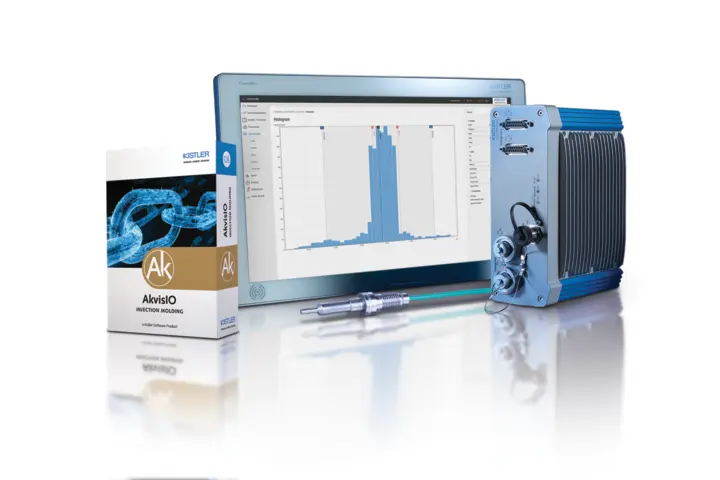With cost reduction high on many companies’ agendas, the most effective levers are strategies that prevent rejects and complaints. In plastic injection molding, piezoelectric cavity pressure sensors and connected systems for process monitoring and control have proven to be particularly effective. Oliver Schnerr, Head of the Plastics Business Unit at Kistler, said: “Together with a customer from the electrical and electronics sector, we recently calculated the return on investment (ROI) of our sensors and our ComoNeo process monitoring system. We came to a convincing conclusion: our customer can assume that the investment in our technology will pay for itself after just four to eight months.”
K Show 2025: Kistler presents solutions for cost reductions in plastics manufacturing
Winterthur, August 2025 – Optimizing processes, processing recyclates and saving costs and at the same time: Kistler will be demonstrating how current challenges in plastics manufacturing can be mastered at K 2025 from October 8 to 15, 2025 (Düsseldorf) in Hall 10 / Stand F51. Visitors will find new and optimized solutions along the value chain, from cavity pressure sensors, systems and software for process optimization and quality monitoring. A new assembly system and an optical inspection machine for end-of-line inspection will also be on display at the booth. The focus is on applications in medical technology and electronics production.

Recyclate processing: consistent product quality thanks to cavity pressure
Monitoring processes and being able to control them as flexibly as possible is becoming increasingly important also in other contexts. For example, in the processing of recyclates. “In many industries, a minimum proportion of recycled material is now required in plastic components. However, the material properties of recyclates vary from batch to batch and even within a batch, which has an impact on product quality and therefore leads to higher costs. Here it is particularly important to keep a close eye on the process and to be able to intervene and readjust as flexibly as possible,” said Schnerr. “The combination of cavity pressure measurement and process control that Kistler is presenting at the trade fair ensures optimum product quality.”
New solutions for plastic injection molding at K
Kistler already presented its updates for the ComoNeo process monitoring and control system for plastic injection molding at the beginning of the year. In addition to optimized user-friendliness, version 7.0 focuses on the additional Multiflow function, which enables automatic control of the individual hot runner nozzles in multi-cavity molds. This gives injection molders maximum control over product quality. The improved hot runner balancing helps both with the processing of recyclates and with cost savings. In addition, ComoNeo has now received a hardware upgrade, giving it significantly more computing power, which shortens processing times and makes the system fit for future functionalities, such as those based on AI.
While ComoNeo actively controls ongoing injection molding processes, the AkvisIO process data management software provides insights into the production history and ensures seamless documentation, as required in medical technology, for example. AkvisIO also evaluates large data sets in just a few seconds and helps to identify cost drivers in the process. “The software solution enables users to compare various quality-relevant key figures across many cycles and uncover correlations. This allows them to quickly find the cause of process fluctuations or increased reject rates,” said Pascal Bibow, who is responsible for the development of AkvisIO at Kistler.
Precisely controllable joining forces in high-speed assembly of plastic parts
With its new NCFQ 2166A joining solution for sensitive plastic parts (product introduction in October 2025), Kistler is particularly addressing the quality and efficiency requirements of medical technology and electronics production. The innovative high-speed joining system combines the high dynamics of linear direct drives (linear motor) with the precision of piezoelectric sensors. Kistler uses LinMot's proven drive technology and supplements it with piezoelectric force sensors and acceleration compensation. This particularly benefits highly dynamic applications with small forces of up to 500 N – such as in the production of auto-injectors and insulin pens. The magnet-based technology of the joining module with linear motor accelerates at up to 50 m/s² and achieves a speed of up to 5 m/s. In addition to the linear motor, the module has a magnetic spring for weight compensation in a vertical installation position. For particularly demanding applications, Kistler offers a version with an additional piezoelectric acceleration sensor for automated acceleration compensation. Kistler also supplements the system with the ICAM-B industrial charge amplifier and the maXYmos NC process monitoring system for maximum data transparency, process reliability and control.
Complete value chain: end-of-line inspection checks for surface defects
Optical quality assurance is the final stage in the value chain presented at the Kistler K 2025 booth. The KVC 821 vision inspection system demonstrates how the 100 percent inspection reliably detects typical sporadic injection molding surface defects and assembly defects – at cycle times of up to 800 parts per minute. To detect previously unknown or rarely occurring anomalies, Kistler also uses artificial intelligence in its KiVision image processing software.
In addition to the vision inspection system, another image processing solution with two camera stations from Kistler can be seen at the K at the stand of the Institute of Plastics Processing (IKV, Hall 14 / Stand C 16). The IKV will be demonstrating the optical inspection in the interlinking process directly after injection molding.






![K 2025: Kistler presents solutions for cost reductions in plastics manufacturing [object Object]](https://kistler.cdn.celum.cloud/SAPCommerce_Document_Preview/999-341e.webp)